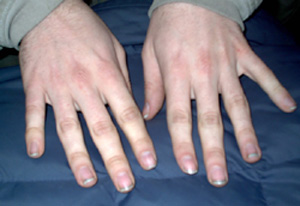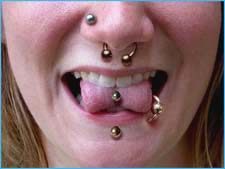 |
Formation of Children
Cleanliness and Good Hygiene
Marian T. Horvat
There is much talk of human dignity today; at the same time few seem to make the practical application to their own personal hygienical care, which is a reflection of our own dignity, of the respect we must have for ourselves.
This matter is set out in this Chapter 7 of the Small Manual of Civility. Forty years ago, a young man was taught not only the proper care to be given to the eyes, nose, ears, and mouth, but also the value of holding his head correctly, how to use a handkerchief, the importance of keeping his fingers off the face and out of the ears. From the time he was young, he understood that chewing gum, sneezing loudly, making unseemly sound or grimaces with the face are improper and a sign of a bad education. He had the good example of his father, uncles, teachers, and other responsible men to show him the virility and charm of the good manners of a Catholic gentleman.
Today, despite the emphasis on human dignity, so often used to foster a socialist agenda, there is mounting evidence that people are losing the sense of their own personal dignity, and are heading to barbarianism. Sad to say, increasingly vulgar customs and primitive ways of being are accepted today in many Catholic milieus – including many conservative and traditionalist schools and homes.
These good customs developed naturally in Catholic society as signs of the respect that we owe ourselves and our neighbor. It would be advisable for both fathers and sons to discipline themselves once again by adhering to these simple guidelines that make life more pleasant for everyone.
Hygiene and cleanliness are integral parts of civility. They are a form and sign of the respect and esteem we owe to our bodies, to ourselves, and to our neighbors with whom we share the pleasures and benefits of social life.
They also constitute a condition and at the same time necessity for the conservation of health. Further, the clean and tidy person is always appreciated for the way he looks; on the contrary, one who presents himself with visible signs of lack of cleanliness is an object of repulsion. Involuntary ignorance can be pardoned; no one, however, pardons dirtiness, the lack of cleanness. Not subjecting oneself to the laws of hygiene results from a lack of the sense of personal dignity. It harms one’s own health, leads to an early old age, and imposes on others the irritation of a repugnant companion.
Good hygiene prevents sicknesses and promotes sociability
Medical studies attest that the lack of hygiene is the most certain cause of numerous sicknesses and the normal route to acquire many bodily and spiritual vices.
Hygiene begins with the body; afterward, it is applied to clothing, and finally it encompasses external ways of living, at work as well as at leisure.

Taking air in the leisurely days of the past |
It hardly needs mention that the daily frequentation of lavatories in the home, school or public place reveals whether a person is well-raised. The well-bred person utilizes them with the maximum cleanliness and decorum, leaves everything in order, and always washes his hands before leaving.
To breathe is to live. Breathing is synonymous with living. Bad breath or shortness of breath diminishes the vitality of the person, reducing both the quality and at times even quantity of life. Breathing exercises that use arm movements to inhale the air combat many internal evils, conserves the good blood flow, and prolongs the life even to an advanced old age.
The first moments of each day, after the morning prayer, should be consecrated to physical exercise and hygiene. Such a regime gives a person a delightful sense of well-being. Taking deep breaths awakens the body, stimulates the organs, eliminates toxins and prepares the ground for the intellectual and moral cultivation of the day.
The four daily baths
The four daily baths recommended by hygienists are
- A mouth wash with a cup of water;
- the external bath for the whole body;
- the bath of fresh air;
- and a bath of sunlight.

The fingernails should be buffeted and clean |
In climates where the temperature is almost always warm, it is necessary to wash the feet every day before lying down. Hands should always be washed before every meal. The fingernails should be buffeted and clean.
Allow me to emphasize the importance of clean nails for us Americans, who need to do - or love to do - all kinds of practical work that results in dirty nails. One of the first things your company notices is your dirty nails. After the face, the hands are what show and reveal the most about your personal hygiene. So, in order to show respect for yourself and maintain the respect of your relatives and friends, never forget to examine your nails and clean them whenever necessary.
To avoid soiling your hands and nails, today there are many different types of rubber, plastic and vinyl disposable gloves, very inexpensive, that may save a lot of time in cleaning your nails.
The head
The head should be held ordinarily in its normal position, that is, erect, slightly inclined forward, without stiffness or flaccidity. One should avoid resting it on the shoulders or chest, nor should one make any precipitous or jerky movements of rotation.
Affirmative or negative responses are expressed by the words YES or NO, and not with any movement of the head.
A man with a hat should lift it slightly as a sign of respect before superiors, ladies, sacred buildings and sacred statues.
Men should uncover their heads when entering a house, church, restaurant, club or any other edifice. Women should keep their head covered in company, inside buildings, during visits to hospitals and museums; in churches it is always required.
It is considered a sign of incivility to pass one’s hand frequently through the hair, to scratch the ears or nose, to comb the hair or twist it in one’s fingers. This behavior is discourteous, vulgar, and offensive.
The hair
The hair should be trimmed every five or six weeks. When cut, it gives the man a vigorous and forceful air; it is the style of the ancient Romans.
With regard to Western customs, long hair is a sign of disorder or ridiculous vanity. It often is the sign of a soft, effeminate character, a man inclined to vanity, spending long amounts of time on the hair, applying ointments, tonics, moistening it with perfumed waters or other products.
Dandruff should be treated with frequent washing with water and special shampoos and by keeping the hair short.
The face

The present day fad for piercing is an affront to the nobility of the face |
The face calls for the greatest cleanliness. It should be washed with soap and water not only upon arising, but also during the day each time it becomes necessary and after any physical exertion that raises abundant sweat. Dry it with a clean towel.
Avoid passing the hands on the face or chin, or drumming your fingers on the chin or cheeks.
It is very annoying to see a person who is constantly moving his lips or running his tongue over them. Every movement of the lips that is not necessary for good pronunciation is uncivil and vulgar.
Every face is worthy of respect because it reflects the soul of the man. To give slaps, cuffs, strikes or blows to the face of anyone is the supreme injury, because it indicates a supreme lack of respect for the offended party.
The ears demand rigorous cleanliness
The ears, like the eyes, are the most precious organs we possess for our external relations. They merit very special and delicate care. They are the organs of the social sense par excellence. They need to be appropriately cleaned daily. This will maintain and preserve your hearing system by avoiding the accumulation of earwax, which often decreases hearing capacity.
The nose
This organ should be treated with special care. Everyone knows that it can be a focus of infection, pestilence, and hazardous microbes if it is not kept clean and given the treatment demanded by good hygiene and customs.
It is repugnant and intolerable to see a person, child or adult, put his fingers in his nose. In addition to being repugnant, it is dangerous because it can cause an irritation that can become a wound that releases foul odors, which is repulsive.
One of the acts that every well-bred man should execute with attention is the discreet use of the handkerchief to clean the nose. There are, however, few who do so with civility.
- First, one should use a clean handkerchief, which implies changing the handkerchief daily;
- Second, one should turn aside from the persons with whom he is speaking;
- Third, he should be as discreet as possible regarding sounds, avoid making loud or rude noises;
- Fourth, the handkerchief should be of an appropriate size, so it does not unfold like a banner;
- Fifth, he should not look at the nasal mucus;
- Sixth, he should fold the handkerchief as it was before using it, and return it to the pocket;
- Seventh, he should not hold the handkerchief in his hand during a conversion, or leave it on a piece of furniture.

The pocket handkerchief used to be an essential item of every man's wardrobe |
When one appears at a public function or solemn occasion in a representative role, as president, secretary, speaker, and so on, the handkerchief may also be used for wiping the sweat from his face or hands, to cover a sneeze, or to clean the lips after drinking water.
Sneezing is an involuntary reflex action. Almost anything that irritates the nose can trigger a sneezing fit, including dust, strong smells, temperature changes, and infections.
Only crude or rustic persons consider it impressive to sneeze with a great clamor, thinking they are showing the strength of their lungs with the inopportune noise. The sneeze spreads germs. Therefore, as much as possible one should sneeze in his handkerchief; if the sneeze is unexpected, the hand at least should serve as a shield to the mouth.
It is a good custom for bystanders to say “God bless you” when a person sneezes. The person would respond, “Thank you.”
Grimacing with the cheeks and nose are inconvenient, not only in public but everywhere; It is also extremely impolite to purposely sniffle, snort, belch, etc.
The mouth

No one used to present himself to the public with an unseemly grimace or open mouth |
The mouth is the preferred way for microbes to enter the body, above all, between the teeth. From this comes the need to keep the mouth very clean.
It should be washed morning and night, and the teeth brushed daily. After taking a strong meal, it is advisable to cleanse the mouth with water, as much for hygienic reasons as for civility. Frequently ulcers and cancer of the stomach are results of the bad state of the mouth and teeth. Also, after eating some foods, such as those with onions and garlic, the breath can become acrid and make the person undesirable company.
A well-bred man never sticks his fingers in his mouth; he does not absently chew on paper or the end of a pencil; nor does he use chewing gum, chewing endlessly for no reason like a cow chewing its cud. Such habits indicate a lack of vigilance over self, a relaxing of civility, or ignorance of good manners.
One might recall this maxim: By his mouth the fish dies … by his mouth a man ruins his health.
Respecting ourselves and others
We should respect our own face and also the face of our neighbors. Any slap on the face of another is always a grave injury.
When he was a child, St. Fr. Marcellin Champagnat saw a somewhat nervous professor cuff the face of a student for his lack of attention. The good sense of the child, who would later be the founder of a teaching order called the Marist Brothers, reproved that brutal act and won from his parents permission to no longer frequent the classes of that master.
History reproved the action of the Jews who commanded the buffeting of the great Apostle St. Paul under the vain pretext of having spoken freely to a priest of the Old Mosaic Law. In the Mosaic Law, an unjust blow to the body of an adversary was fined with a single shekel, or $10 of our money. But a blow to the face was punished with a fine of 300 denarii, or $ 4,000.
Other bad treatment to the head, such as to pull the hair, ears, etc. received similar penalties, and with just cause.
We should make it a custom to consider our neighbor as a member of the mystical body of Our Lord Jesus Christ and respect him as a creature made in the image of God.

Posted November 16, 2006


Related Topics of Interest
 Chapter 6: The Eyes and the Gaze Chapter 6: The Eyes and the Gaze
 Chapter 5: Order in the Professional Life Chapter 5: Order in the Professional Life
 Chapter 4: Order and the Spirit of Order Chapter 4: Order and the Spirit of Order
 Chapter 3: How to Sit, Stand, Walk Chapter 3: How to Sit, Stand, Walk
 Chapter 2: Bearing Chapter 2: Bearing
 Introduction and Chapter 1 Introduction and Chapter 1
 Four Ways to Discern a Man's Soul by His Appearance Four Ways to Discern a Man's Soul by His Appearance
 The Eyes Are the Mirror of the Soul The Eyes Are the Mirror of the Soul
 The Face Reveals the Heart of the Man The Face Reveals the Heart of the Man
 Dressing Well - Vanity or Virtue? Dressing Well - Vanity or Virtue?

Related Works of Interest
|
|
Formation | Cultural |
Home | Books | CDs
| Search | Contact Us
| Donate

© 2002- Tradition in Action, Inc. All Rights Reserved
|
 |
|